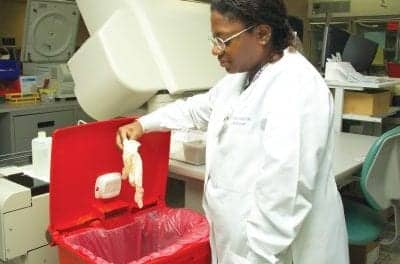IQuum Inc announced it has been granted an Emergency Use Authorization (EUA) from the FDA for its Liat™ Influenza A/2009 H1N1 assay.
The assay detects and differentiates 2009 H1N1 influenza viral RNA starting from collected nasopharyngeal swab samples in less than 30 minutes. The entire nucleic acid testing process from sample to result is automated on the Liat Analyzer. The authorization allows IQuum’s Liat Influenza A/H1N1 Assay to be used in laboratories certified under the Clinical Laboratory Improvement Amendments (CLIA) to perform "moderate complexity" (not waived) tests, enabling use in hospital near-patient settings.
"IQuum’s Liat system is aimed at bringing a high-performance nucleic acid test to largely the same level of simplicity and speed as rapid immunoassays," said Dr Shuqi Chen, Chief Executive Officer of IQuum. "The ability to perform nucleic acid testing while a patient is waiting and receive reliable results immediately is highly significant for pandemic preparedness, clinical decision making, and public health."
The 2009 H1N1 is an influenza A virus that emerged in April 2009. This novel influenza virus spread widely and has become the predominant circulating influenza strain in the US In response to the worldwide spread of this novel influenza, the World Health Organization further raised the pandemic alert level to Phase 6 in June 2009, the first time the organization has done so in 40 years.
The Liat Influenza A/H1N1 Assay automates and integrates sample purification, RT-PCR amplification, and real-time detection of the 2009 H1N1 viral RNA from nasopharyngeal swab specimens. The test targets a conserved region of the matrix gene of influenza A viral RNA and the hemagglutinin gene of 2009 H1N1 influenza viral RNA, along with an internal process control to ensure the quality of results.
The assay’s turnaround time is less than 30 minutes. Yet, the Liat assay demonstrated 100% positive percent agreement and 100% negative percent agreement (lower 95% confidence interval: 90.1% positive agreement; 92.9% negative agreement) with a comparator EUA assay in 85 clinical samples tested, including 35 samples positive for 2009 H1N1.
Source: IQuum


